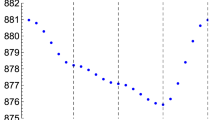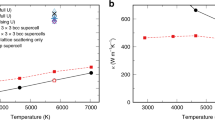Abstract
AN investigation has been made of the mechanism of diffusion of chromium into iron–carbon systems over the temperature range 950°–1,265° C. At temperatures above 825° C, the diffusional mechanism of chromium into iron is complicated by a change in crystal structure from a body-centred cubic lattice (α-phase) to a face-centred lattice (γ-phase). At low concentrations of carbon, a lattice-vacancy diffusional mechanism has been postulated, and a moving boundary model set up to represent this condition1. The results have confirmed that at concentrations of carbon of less than 0.16 per cent only lattice-vacancy diffusion was effective. At concentrations of carbon above this, the interstitial atoms hinder diffusion.
This is a preview of subscription content, access via your institution
Access options
Subscribe to this journal
Receive 51 print issues and online access
$199.00 per year
only $3.90 per issue
Buy this article
- Purchase on Springer Link
- Instant access to full article PDF
Prices may be subject to local taxes which are calculated during checkout
Similar content being viewed by others
References
Davies, G. A., Ponter, A. B., and Menzies, I. A., Amer. Inst. Chem. Eng. J. (in the press).
Author information
Authors and Affiliations
Rights and permissions
About this article
Cite this article
DAVIES, G., PONTER, A. & MENZIES, I. Effect of Interstitial Atoms on a Lattice-vacancy Diffusional Process. Nature 209, 1125–1126 (1966). https://doi.org/10.1038/2091125b0
Issue Date:
DOI: https://doi.org/10.1038/2091125b0
Comments
By submitting a comment you agree to abide by our Terms and Community Guidelines. If you find something abusive or that does not comply with our terms or guidelines please flag it as inappropriate.



